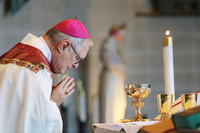
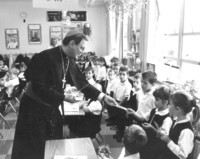
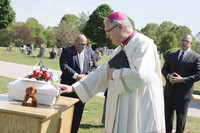
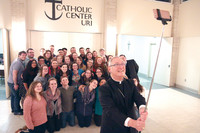
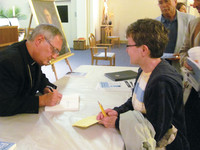
One of the nation’s most avid high-profile fans of the Pittsburgh Steelers knows very well that it takes both a great offense and defense to win games. And in a quarter century as a prelate of the Roman Catholic Church, Bishop Thomas J. Tobin has drafted these attributes into his own ministry playbook, serving as both a staunch advocate for those most in need and defender of the principles the faith holds most dear.
He has challenged politicians and pundits, defending vigorously the precepts of the faith.
Last week the bishop sat down with Rhode Island Catholic to reflect on the upcoming 25th anniversary of his episcopal ordination, and the formative years that led to his journey down this path.
He recalled the momentous occasion in his life when he was installed as an auxiliary bishop in his native and beloved Pittsburgh on Dec. 27, 1992, by then-Bishop Donald Wuerl, with Bishops Anthony Bosco and Nicholas Dattilo serving as co-consecrators.
“Being called to be a bishop certainly came as a surprise. It’s nothing you expect, it’s nothing you plan for or strive for,” Bishop Tobin said. “I was serving the bishop and serving the diocese as well as I could as the vicar general, the general secretary of the diocese and moderator of the curia and I presumed I would do that for a while and someday go back to a parish. That was my long range plan.”
“But then, you get the call that the Holy Father has named you to be a bishop, to be the auxiliary bishop of Pittsburgh and you realize that your life has changed completely forever, and that it would never be the same again, and that’s certainly proven to be true.”
When he was appointed by now-Pope St. John Paul II on Nov. 3, 1992, to serve as auxiliary bishop in Pittsburgh, he would by the end of the year become the second youngest bishop in the country.
Three years later, on Dec. 5, 1995, he was named to become the Fourth Bishop of Youngstown, Ohio. He was installed on Feb. 2, 1996.
“When I went to Youngstown I was the second youngest ordinary in the country. I was only 47 years old when I took over a diocese,” Bishop Tobin said.
The next nine years would be a challenging time for him as he was brought in to fill the shoes of a native son of the diocese who had served as shepherd over the flock there for the previous 27 years.
“It was challenging because I replaced a bishop who was a legend, Bishop James Malone,” he said.
Bishop Malone had been president of the national conference of Catholic bishops and was a nationally known figure who had spent decades in the diocese and was widely respected and loved.
“And then I come in as this young guy from across the border in Pittsburgh and he was 75 and I was 47. So that was a challenge in itself replacing a great man like Bishop Malone who left his mark not just on Youngstown but also on the national church,” he smiled.
Still, over the next nine years, Bishop Tobin would make his mark on the Youngstown diocese.
He would work to enhance the many wonderful things already going on in Youngstown by focusing on strengthening the Catholic identity of the diocese.
He supported the vibrant Respect Life Ministry by starting a Human Life Guild, as well as a number of devotional programs, such as a night to honor Mary Our Mother, an annual Wedding Anniversary Mass, the Golden Eagle teacher awards to recognize outstanding Catholic school teachers, along with Youth Ministry Awards.
In Youngstown, he also began writing his very popular “Without a Doubt” column in his diocesan newspaper that he continues writing in Rhode Island Catholic. He has also authored two books which compile his voluminous writings.
The bishop focused on strengthening the celebration of the liturgy and devotions.
“A lot of what I had to do in Youngstown was not so much creating new things but to make more explicit the Catholic identity, the things I would be naturally inclined to do anyhow,” he said.
Even though Bishop Tobin came to Youngstown with a fair amount of diocesan pastoral and administrative experience, he soon found there was a distinct difference between his previous service as an auxiliary bishop and his new role as ordinary.
“You have all the ultimate responsibility for everything that happens in the diocese. Even if you’re not responsible for it, you’re accountable for it,” he said. “So you’re dealing with ultimate decisions about clergy assignments, finances, schools, personnel, social services, public relations and media and scandals and legal issues — it’s all on your desk. So that’s a huge difference between being an auxiliary bishop and helping another bishop and then being at the desk and have everything stopping there.”
On March 31, 2005, Bishop Tobin would become Pope St. John Paul II’s final appointment when he was named to become the Eighth Bishop of Providence. He was installed on May 31, 2005.
He describes that moment as a combination of “excitement and fear.”
“I knew that Providence had a very strong and vibrant Catholic Church as well as its history,” he said.
“I knew I was going to a much bigger challenge, a much bigger church. There would be new challenges, but there would also be new opportunities.”
Bishop Tobin went from serving as the shepherd of a diocese of about 90 parishes to one with about 150. And, unlike in Ohio, the Diocese of Providence covers the entire state.
“You have an impact, through the things you say and do, on the whole state,” with that impact stretching from Burrillville to Block Island and from Woonsocket to Westerly.
He would find too that his words would also have national import when a request he made of a local congressman became public.
Bishop Tobin had written Democratic Congressman Patrick Kennedy to request that given his positions on human life that he refrain from receiving the sacrament of holy Communion.
“I had written to Congressman Kennedy three years before he went public with it and so when it did erupt I was a little surprised by the timing of it there and early on there were some misstatements and confusion on his part that we had to correct,” Bishop Tobin said.
He noted that it was a great surprise to him that it became such a public issue.
“He started that debate when he attacked the American bishops for their not supporting the Obamacare healthcare proposal. He challenged the prolife credentials of the American bishops,” Bishop Tobin said, noting that he received interview requests from news outlets across the country.
The bishop said that he is most proud of all the good work being done every day by the diocese and the staff that he is very thankful for as they continue their mission of charity and goodwill to all, Catholic and non-Catholic alike, on behalf of the church.
“As bishop I’m in a unique position to see that, from my perspective I see what the church does every day,” he said. “We have so many good things going on and we’re in a privileged position to see it and witness it. It’s a source of great comfort and encouragement to me.”
He said that he has intentionally tried to have the diocese more directly involved in the direct delivery of charitable services so that people can see that the church is making a difference through its more than three dozen active ministries across the diocese.
“Every day we’re preaching the word of God and proclaiming important moral values. Every day we’re educating children in suburban schools and inner city schools, elementary and high schools. Every day we’re serving the poor and needy. Every day we’re bringing together people in houses of worship to focus on God,” he said.
He is also very proud of the work being done to serve clients in the “Keep the Heat On” energy assistance program, as well as at Emmanuel House, the diocesan men’s homeless shelter, and of the support given to local food pantries and soup kitchens.
And during the state’s employment crisis, the diocese worked with several parishes to provide opportunities to help people find jobs.
“I’m also very proud of the fact that the diocese has been at the forefront of welcoming immigrants and refugees and helping refugee families to be settled here. We’re among the leaders in the state in terms of helping refugees which is something very consistent with our Christian values and something that Pope Francis has encouraged,” Bishop Tobin said.
“We don’t have a religious test for any of the charitable works we do,” he said.
In the coming year Bishop Tobin will also mark another milestone: He will turn 70 on April 1.
When a bishop reaches the age of 75 they are required to submit a letter to the Vatican indicating their intention to retire from active ministry.
So does the bishop already have a plan for the next few years?
“I have a six-year strategic plan — keep things going and then retire,” he laughs.
But before he reaches that point, he feels there is still much to do.
“We need to maintain our basic ministry in the midst of a very changing world and a very changing state,” he said. “Our numbers are changing. We don’t have very many young people anymore.”
He also noted that we’re also living in an increasingly secular society in which many have drifted away from the church.
“The lack of young people affects our schools, affects our vocations, affects our sacramental programs,” he said, with a hope that going forward the diocese can do the best it can to maintain the basic ministry of the church, emphasizing the importance of evangelization.
There will be much excitement in the next four years as the diocese prepares to celebrate its 150th anniversary.
It’s an opportunity for the church to do many things, such as the launch this year of a $50 million capital campaign to help strengthen both the diocese and local parishes.
“We will prepare for the anniversary in terms of charitable programs, liturgical celebrations, cultural and artistic celebrations,” he said. “We will find multiple ways of celebrating our anniversary, of thanking God for our Providence in the past and also renewing our commitment to the future knowing that our future will be different than the past.”
“The one thing constant will be God’s Providence and the work of the church.”